
A Problem Called Hassan Rouhani
The editorial of Arman Melli, penned by “reformist” academic Sadegh Zibakalam, explains why Iranian “hardliners” are facing a new problem regarding how to deal with former President Hassan Rouhani and his running for the Assembly of Experts.
The radical “hardliners” in Iran know very well that former President Rouhani has lost his popular support. There will be a big difference between Rouhani’s 24 million votes in 2017 and 2024. But they are still worried that some people might go to the ballot box and vote for Rouhani, not because they are interested in him but because of their disagreements with the “hardliners.”
Despite the considerable drop in Hassan Rouhani’s political and social support, the “hardliners” are worried that even if 1% of the 24 million people vote for Rouhani just to upset the “hardliners,” then most of the “hardliners’” plans and programs will be disrupted.
So they are resolved to avoid this risk and not allow Rouhani to enter the election race. This means they will pressure the oversight entities to disqualify Rouhani. Disqualification of the former president will satisfy the “hardliners” but at a great cost.
That is because for 45 years, Rouhani has been involved in the highest security positions in the country; for two terms he was Iran’s president, he has been a member of the Supreme National Security Council and was the supreme leader’s representative in this council, and he has been a lawmaker for several terms.
Now, the disqualification of Rouhani with such a background would question the process of vetting candidates. It will also mean that a small group of “hardliners” have taken control of the country, doing whatever they want to. The disqualification of Rouhani will definitely harm the election’s credibility. So, although the “hardliners” will be the winners, it will be at a huge cost.
There is also another way for the “hardliners:” They will not get rid of Rouhani by disqualifying him; rather, they will launch a negative propaganda campaign against him so that no one will vote for him.
Whatever happens, one thing is certain: the “hardliners” are facing a new problem called Rouhani and his running for the Assembly of Experts.
Henry Kissinger: Architect of US Diplomacy or War Criminal?
The editorial of the Iranian government-affiliated newspaper Quds Daily raises questions about US diplomat Henry Kissinger, who died recently.
Henry Kissinger, famous political strategist and former US secretary of state, died at the age of 100.
He was born to a Jewish family who migrated from Nazi Germany to the United States in 1938. From 1968 to 1977, in the governments of Richard Nixon and Gerald Ford, he played a significant role as the “main architect of US foreign policy” as national security advisor and secretary of state.
Kissinger was influential in creating diplomatic openings between the United States and China, arms control negotiations between the United States and the USSR, and the Paris deal with northern Vietnam. In 1973, he was awarded the Nobel Peace Prize for his efforts in Vietnam’s truce, which was a very controversial decision.
Many have called him the most influential diplomat of the 20th century, the most famous American diplomat, and a great theoretician. But on the other hand, his critics call him a “war criminal,” “defender of tyrannical regimes” and someone who “has inflicted lasting damage on the world.”
For instance, Mick Wallace, the Irish legislator in the EU Parliament, wrote recently about Kissinger that he was a war criminal who played a role in destroying the lives of millions of people but was never held accountable.
Kissinger and Nixon were responsible for the deaths of 85,000 Cambodians. This massive death toll led some analysts try to hold Kissinger accountable for his war crimes — an issue that he always evaded.
Is China Covering Up the Truth Again?
The editorial of Hamdeli asks whether the way the Chinese government is acting with regard to a new contagious respiratory disease might lead to another global disaster like the coronavirus pandemic.
Untransparent, closed governments not only cause problems for their own people, but they create problems for people all over the world. The case of the coronavirus pandemic was an example of this issue.
If China’s government had been transparent and there had been a better information flow in the case of COVID-19, then global organizations could have definitely acted better. But the way the Chinese government acted, the world made a mistake and acted very late.
So, as said before, the Chinese government is not just harming its own society. In the case of coronavirus, it was demonstrated that government behavior can have unlimited, all-embracing impacts. It must be noted that the more influential the government, the more far-reaching the impact.
As China is very powerful in the world because of its population and economy, its rulers’ decisions can be very impactful. So when a country like China does not act transparently in cases like new diseases and does not allow the world to be properly informed about them, other international organizations and governments will inevitably make mistakes.
Now, once again, we are witnessing irresponsible behavior by the Chinese government. It has been two months since a serious contagious respiratory disease has gone viral in northern China, particularly among children.
The World Health Organization (WHO) has asked the Chinese authorities to provide more information in this regard, but they have said nothing new has happened and it is just a combination of mycoplasma, flu and RSV! This has created concerns for the world with a number of experts believing that we must anticipate a harsh winter.
Of course, it is possible that no such thing as coronavirus happens this time and the Chinese government might be providing the correct information. But because of the previous bitter experience, the world is rightfully asking the Chinese authorities to act better in such cases. Let us hope that this new disease which is spreading in China has nothing to do with coronavirus and it all comes to a happy ending.
Tough Conditions for Selling Iran’s Oil
The editorial of Tejarat explains all the different ways in which Iran’s oil and gas exports are facing dire conditions in the region and the world.
The fact is that Iran’s neighboring countries are signing energy deals with bilateral or multi-lateral consortiums, so much so that Turkey has signed a contract for transporting oil to the Gulf through Iraq, which does not include Iran.
Iran’s northern neighbors like Azerbaijan and Turkmenistan — through Baku, Tbilisi, Zangezur, Nakhichevan, and Turkey — sidestep Iran from another route. Turkmenistan too intends to connect itself to the Sea of Oman through Afghanistan and Pakistan. In fact, Iran which is on the path of these pipelines, is not included in any of these projects.
India was a buyer of Iran’s natural gas, but the Peace Gas Pipeline — which was supposed to pass through Pakistan and India – did not become operational. Instead, a contract has been signed with Qatar and they are going to establish a pipeline from Qatar, the UAE, Oman to India and then to Saudi Arabia and Palestine’s occupied region.
All these projects show that neighboring countries like Turkey, Turkmenistan, Azerbaijan, Afghanistan, Pakistan and the Gulf states are cooperating with each other. But Iran is not involved in any of these projects.
Kazakhstan also has oil contracts with Azerbaijan, Turkey and Turkmenistan, and a part of Russia’s natural gas is exported through Turkey. But Iran’s place in any of these corridors is not clear. Because of sanctions against Iran, investment companies do not accept the risk of investing in Iran.
The second issue is that of the banking system. We cannot sell our oil and gas and buyers and investors require security guarantees with regard to long-term projects. But because of the existing conditions in Iran, they are bypassing Tehran.
Iran is going to rely on its neighboring countries because it has to connect to these pipelines and pay them taxes, tariffs and rent and work under their rules. As such, in future, they will be managing Iran which holds a strategic position and is the second-largest source of oil and gas in the world.
In addition to the international issues facing Iran, there is also the problem of old oil wells which are in dire need of renovation. In past years, no upgrades have occurred in these wells due to sanctions and the lack of necessary equipment.

Saudi Arabia, Iran Military Officials Talk After 15 Years
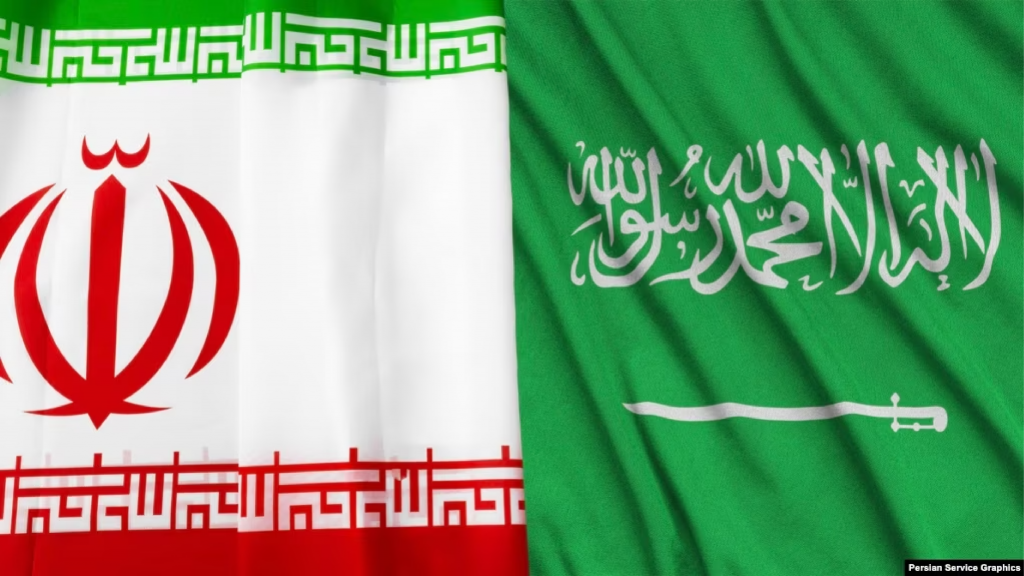
Saudi Defense Minister Prince Khalid bin Salman Al Saud and Chief of Staff for the Armed Forces of Iran Mohammad Bagheri held a phone conversation. This is the first time in at least the past 15 years that senior military-defense officials of Iran and Saudi Arabia have talked with each other.
Iranian pro-government media welcomed this talk between senior military officials as a step in “enhancing military relations” between Riyadh and Tehran, while the Saudi Defense Ministry’s statement just pointed to discussing bilateral military and defense relations between the two countries.
According to Iranian news agencies, Mohammad Bagheri underlined Tehran’s readiness to enhance military relations with Riyadh in his conversation with Prince Khalid bin Salman.
The Saudi Defense Ministry, on its X account, pointed to talking over a phone call, writing that “in his talk, bilateral relations of both countries with regard to military and defense fields were discussed.”
Iran and Saudi Arabia resumed their relations after seven years and under the mediation of China earlier this year.
Curtain Rises to Expose Huge Corruption in Iran: $2 Billion Unaccounted for in Tea Imports
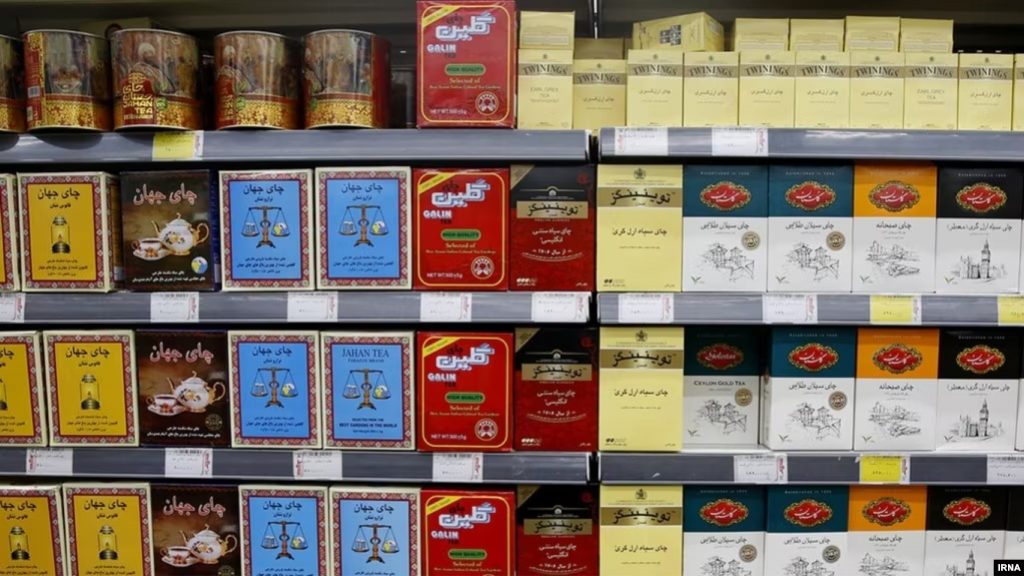
Iran’s General Inspection Office announced the discovery of a $2 billion embezzlement in importing tea by a “specific group,” saying that they received currency but never imported the goods to the country.
According to this report, a “commercial group” received around $3.370 million in NIMA currency (a system allowing importers to purchase foreign currency at a lower rate) between 2019 to 2022 for importing tea and machinery but they sold a major amount of the currency in the free market at a high price instead of importing tea.
Head of the General Inspection Office Zabihollah Khodaian noted that 79% of NIMA currency dedicated to importing tea to Iran from 2019 to 2022 was given to this “commercial group.”
The “commercial group” had registered an order for an Indian quality brand, Darjeeling, for $14 per kilogram. However, it imported Kenyan tea as well as second-rate tea which Iran itself exports for $2 per kilo. Not to mention that Iran’s Food and Drug Organization had approved the quality of those imported teas.
Meanwhile, the news of this massive corruption scandal has sparked off reactions from different authorities, including Ebrahim Raisi’s government who tried to take the credit for uncovering it. “In the tea case, the government not only discovered the corruption, but sacked all top directors related to it while referring the case to the judiciary for issuance of sentences,” remarked Chief of President’s Special Inspection Office Hojatoleslam Darvishian.
The names of those directors, however, were never mentioned. The company was said to have the monopoly of 79% of Iran’s tea import in coordination with the Ministry of Industry, Mines and Trade as well as the Ministry of Agricultural Jihad and the Central Bank of Iran.
“Allocation of such mega-bucks without an extensive cooperation, coordination, special authorizations and approval of high rank officials is impossible,” stated former member of the Iran Chamber of Commerce Pedram Soltani. “This is an unprecedented level of not only corruption, but also collaboration.”
Intensification of Air Pollution in Tehran; Officials’ Lie Exposed
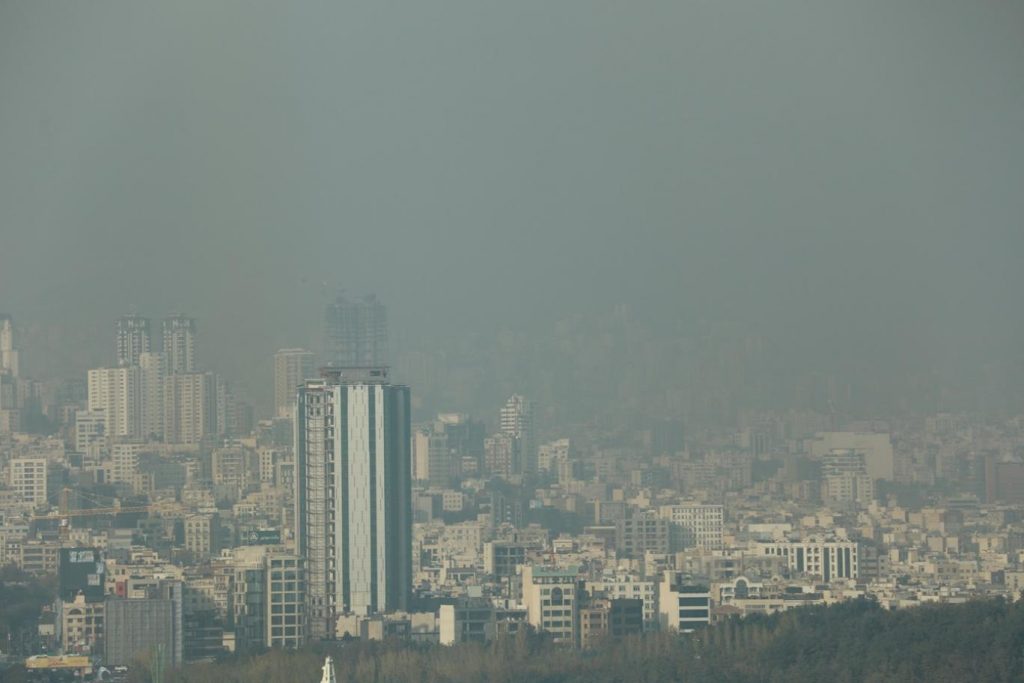
After last week’s confession by a member of Tehran City Council to using mazut in Tehran as one of the main causes of the increase in air pollution in the capital city of Iran over the past month, Mehdi Pir-Hadi, head of the Health Commission in Tehran City Council, revealed that at least two thirds of power plants in Tehran province are using mazut.
According to Pir-Hadi, based on the report by the Parliament’s Article 90 Commission, 6,398 people lost their lives in 2021 because of diseases caused by air pollution. He added that the representative of the Oil Refinery and Distribution Company officially announced that two power plants in Tehran are still using mazut.
These remarks were made while the CEO of National Oil Products Distribution Company had stated in a press conference that in Tehran Province no mazut is used in power plants and the distributed gasoline and diesel are in compliance with European standards.
Last week, Tehran City Council Chairman Mehdi Chamran stated regarding the intensification of air pollution in Tehran that mazut might be used in other parts of the country “but not in Tehran.”
In the meantime, an official from Iran’s Department of Environment stated that more than 26,000 people lost their lives in 33 cities in 2022 due to air pollution.
Iran is one of the few countries in the world still using mazut in power plants across different cities. Mazut is one of the most lethal oil derivatives, and Russia, Kazakhstan, Azerbaijan and Turkmenistan are among the countries along with Iran that are still producing it. Many cities have stopped using mazut due to its danger for citizens’ health.
According to Iranian media, following the intensification of air pollution in Tehran, all classes in primary and middle schools were held online on Sunday and Monday, while children and those with underlying conditions and respiratory diseases were advised to avoid going outdoors.
Cuba, Iran Cooperate to Sidestep US Sanctions
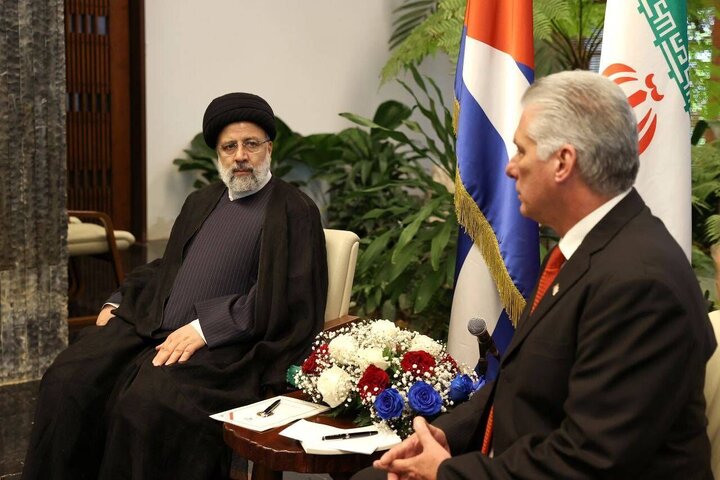
Cuban President Miguel Diaz-Canel entered Tehran heading a political and economic delegation to meet with his Iranian counterpart President Ebrahim Raisi and other high-ranking Iranian authorities. Last time, it was late Cuban President Fidel Castro who in an official trip visited Iran 22 years ago and delivered a praiseful speech for the founder of the Islamic Republic Ayatollah Khomeini.
This trip was upon the invitation of President Raisi, who had visited Havana earlier this year and met with the Cuban president.
The Cuban president also met with Iranian Supreme Leader Ali Khamenei during this trip.
Seven documents and memorandums of understanding were signed by senior Iranian and Cuban officials during this official visit.
Along with two other Latin American countries, Venezuela and Uruguay, Cuba is one of Iran’s allies and supporters in international organizations and groups. According to the pro-Iranian government Mehr News Agency, Iran’s common ground with these three countries is their fight against the United States and its hegemony in international relations. At the same time, Mehr News Agency added that Iran’s growing interest in these Latin American countries and developing relations with them is to alleviate the pressure of international sanctions as well as support each other in international groups and organizations.
Given the fact that both Iran and these Latin American countries are under severe economic sanctions, it seems that Iran and Cuba are trying to cooperate with each other to circumvent the sanctions.
The Cuban president’s trip to Iran is said to serve two purposes: the political goal as well as the economic goal of sidestepping international sanctions, which is reportedly going to happen through bartering goods, resources and services.
According to Mehr News Agency, Cuba is currently under the worst economic sanctions, so the bartering system can create openings for the Iranian government. In lieu of cooperation to circumvent international sanctions, Mehr news agency points out that Iran will be present in the United States’ backyard.
Attack Against an Afghan Immigrant Settlement in Iran Following the Killing of a Youth
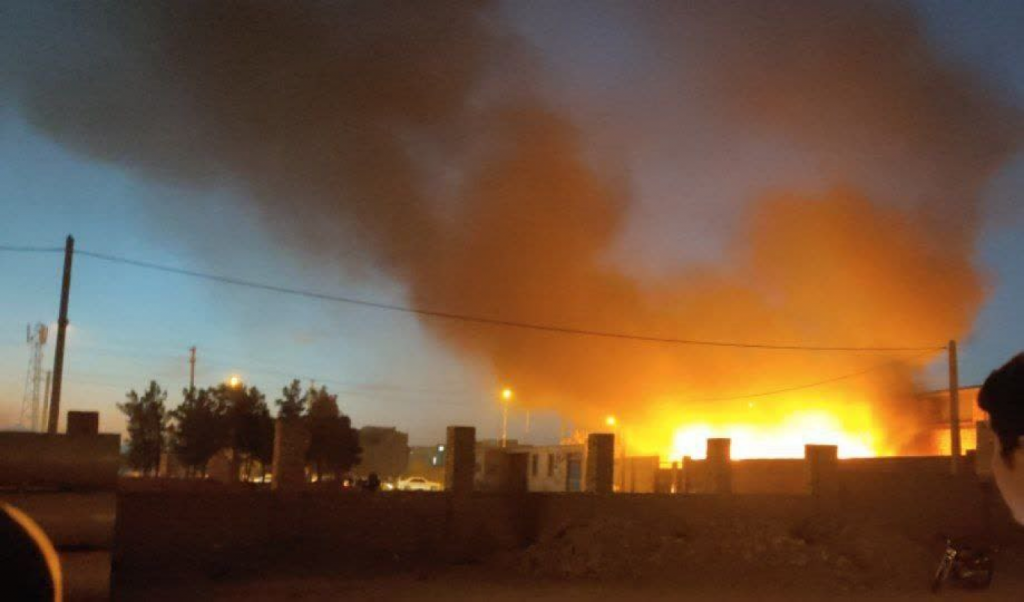
After a young man was killed in a street fight in the city of Meybod, Yazd Province, the residents of the city attacked an Afghan immigrant settlement.
A young Yazdi man called Amir Reza Aghaee, after a scuffle in Meybod, was stabbed to death and another individual was wounded and taken to hospital. Local officials have not mentioned the name or the nationality of the assailant, but some media outlets claimed he was an Afghan – a claim that has not been confirmed yet.
Meybod’s governor said that two suspects have been identified — with the main suspect hiding in a neighborhood in the city of Yazd. Meanwhile, Iranian media released footage of attacks in the area where Afghan immigrants live in this city. The footage shows a part of the neighborhood on fire with some fleeing the scene.
According to Meybod’s mayor, the people of this city have called for expelling foreign citizens for a long time from their city, adding that there are 12,000 Afghan citizens in Meybod, but this number excludes the illegal immigrants in this city.
After the Taliban took over Afghanistan, the number of Afghan immigrants in Iran has significantly increased. In certain cases, people have leveled criticism against the government for mismanaging the issue of immigrants and asylum seekers.
The head of the office for foreign citizens in the city of Yazd said earlier that the exact number of asylum seekers in this city is not clear, but according to previous statistics, about 140,000 foreign citizens – mostly from Afghanistan, Iraq and Pakistan – are in Yazd Province.
In recent months, the Iranian government has increased the deportation of Afghan immigrants, despite poor economic, humanitarian conditions and increasing unemployment in Afghanistan.
Earlier, Iran’s Interior Minister Ahmad Vahidi had announced an increase in the expulsion of illegal immigrants from the country, saying that nearly 400,000 illegal immigrants have been deported to their countries.
